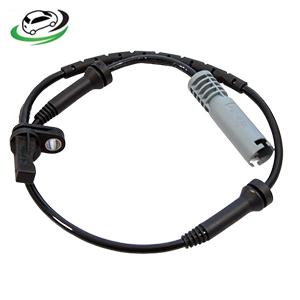-18%
Get Front ABS Sensor 34526762465 BMW E81-E91
The Anti-Lock Braking System (ABS) sensor is a crucial component in modern vehicles, playing a pivotal role in enhancing safety during braking. ABS sensors monitor wheel speed and provide real-time feedback to the ABS control module, allowing for precise control over braking forces during emergency stops. Understanding the importance of ABS sensors and recognizing signs that indicate the need for replacement is essential for maintaining effective braking systems and ensuring overall driving safety.
Importance of ABS Sensors:
- Enhanced Braking Performance: ABS sensors contribute to enhanced braking performance by preventing wheel lock-up during sudden or hard braking. By constantly monitoring the speed of each wheel, the ABS system adjusts brake force to prevent skidding, allowing the driver to maintain steering control and avoid potential accidents.
- Improved Steering Control: During emergency braking, ABS sensors help maintain steering control by preventing wheel lock-up. This allows the driver to make steering adjustments even under heavy braking conditions, enhancing overall vehicle stability and reducing the risk of collisions.
- Reduced Stopping Distances: The ABS system, facilitated by ABS sensors, optimizes braking efficiency by preventing wheel lock-up. This results in shorter stopping distances, especially on slippery or uneven road surfaces. ABS contributes to the vehicle’s ability to come to a controlled stop in emergency situations.
- Prevention of Skidding: One of the primary functions of ABS sensors is to prevent skidding during braking. By modulating brake force on individual wheels, ABS ensures that the tires maintain traction with the road surface. This prevents the vehicle from skidding, reducing the likelihood of losing control.
- Enhanced Traction: ABS sensors contribute to improved traction by preventing wheel lock-up. Maintaining traction during braking is crucial for stability and control, especially in adverse weather conditions. ABS enhances overall vehicle performance by ensuring optimal traction in various driving scenarios.
- Minimized Tire Wear: By preventing wheel lock-up and skidding, ABS sensors contribute to minimized tire wear. Skidding can lead to uneven tire tread wear and reduced tire lifespan. The controlled braking provided by ABS helps extend the life of tires, promoting cost-effectiveness for vehicle owners.
Signs You Should Change the ABS Sensor:
- ABS Warning Light: The most obvious sign that an ABS sensor requires attention is the illumination of the ABS warning light on the vehicle’s dashboard. If the ABS system detects a fault in the sensor or related components, it triggers the warning light to alert the driver. Ignoring this warning could compromise the ABS system’s effectiveness.
- Unresponsive ABS System: If the ABS system becomes unresponsive during hard or emergency braking, it may indicate a malfunctioning ABS sensor. A failure in the sensor can disrupt the system’s ability to modulate brake force on individual wheels, resulting in a loss of ABS functionality.
- Strange Noises During Braking: A malfunctioning ABS sensor can lead to unusual noises during braking, such as grinding, clicking, or buzzing sounds. These noises may be indicative of issues within the ABS system, including sensor malfunctions. Addressing these noises promptly is essential for maintaining optimal braking performance.
- ABS System Activation at Inappropriate Times: If the ABS system activates at inappropriate times, such as during normal braking on dry roads, it may signal a problem with the ABS sensor. False ABS system activation can compromise the vehicle’s braking efficiency and may lead to increased stopping distances.
- Pulsating Brake Pedal: A pulsating or vibrating brake pedal during ABS activation can indicate sensor-related issues. The ABS system modulates brake force rapidly to prevent wheel lock-up, and irregularities in this process may result from a malfunctioning ABS sensor. A smooth and controlled ABS activation is essential for effective braking.
- Poor Traction on Slippery Surfaces: A malfunctioning ABS sensor may lead to reduced traction on slippery surfaces. If the ABS system fails to prevent wheel lock-up in icy or wet conditions, it can compromise the vehicle’s ability to stop safely. Poor traction during braking is a clear indication that the ABS sensor requires attention.
- Inconsistent ABS Activation: Inconsistencies in ABS system activation, such as erratic or intermittent operation, may point to a faulty ABS sensor. Reliable and consistent ABS activation is crucial for ensuring predictable braking behavior and preventing skidding.
- Decreased Stability During Braking: A malfunctioning ABS sensor can result in decreased stability during braking, especially in emergency situations. If the vehicle exhibits instability, veering to one side, or a lack of steering control during hard braking, it suggests a potential issue with the ABS sensor.
Conclusion:
ABS sensors are integral to the safe and effective operation of the Anti-Lock Braking System, contributing to enhanced braking performance, steering control, and overall vehicle safety. Recognizing signs that indicate the need for ABS sensor replacement, such as ABS warning lights, unresponsive ABS systems, and strange noises during braking, is crucial for maintaining optimal braking functionality. Regular inspections, prompt replacements, and adherence to recommended maintenance schedules contribute to the longevity and reliability of ABS sensors, supporting a safe and controlled driving experience. By understanding the importance of ABS sensors and staying vigilant for signs of wear, vehicle owners can uphold the integrity of their ABS systems, promoting safety on the road.
Follow us on Facebook for more parts.



